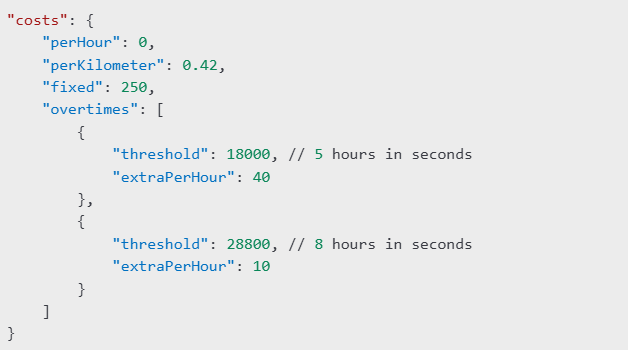A powerful new feature has been introduced to add flexibility and precision to cost management in route planning: Overtime costs.
What are overtime costs?
This enhancement to the Route Optimization OptiFlow API allows the definition of overtime costs, enabling a more accurate reflection of real-world operational expenses. With this feature, additional costs can be configured for extended route durations that exceed specific thresholds.
This functionality is particularly useful for:
- Accounting for labor laws that require higher pay rates for overtime hours.
- Lower overall expenses by strategically minimizing overtime costs where applicable
- Ensuring more precise and realistic cost estimations in the planning.
How it works
The new overtime costs parameter introduces a way to specify extra costs per hour beyond a set duration threshold. Here is how this feature works:
- Fixed Costs: The base cost for the first part of the journey, up to a specified threshold, remains unchanged.
- First Overtime Level: Once the initial threshold is crossed, an additional cost per hour is applied.
- Second Overtime Level: If the route exceeds a higher threshold, a new rate can be specified to further adjust costs.
Example
Consider the following scenario where a route duration triggers overtime costs:

- The first 5 hours are covered by the fixed cost of 250.
- After 5 hours (18,000 seconds), an additional cost of 40 per hour is applied.
- After 8 hours (28,800 seconds), an extra 10 per hour is added, making the total extra cost 50 per hour for this period.
For a route duration of 8.5 hours, the total cost calculation would be: 250 (fixed cost) + (3.5 × 40) + (0.5 × 10) = 395.
Assigning a route to a vehicle results in a cost, which the optimization process aims to minimize by evaluating all potential options. Overtime costs influence this process by encouraging the optimization to favor routes that reduce or avoid these additional expenses whenever feasible.
- Optimize routes: Dynamically adjust routes by evaluating alternative paths, schedules, or vehicle assignments to effectively minimize overtime costs without compromising operational efficiency.
- Granular Cost Management: Accurately model operational expenses for extended routes.
- Improved Budgeting: Build precise and transparent cost estimates.